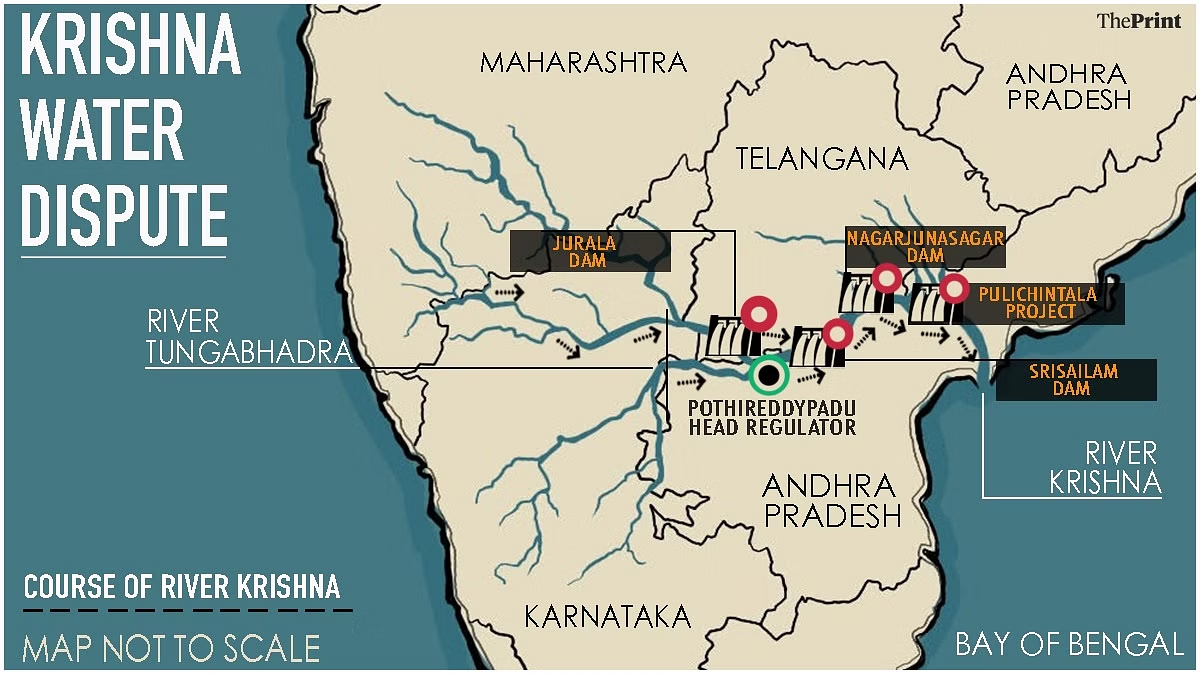Ahmedabad
(Head Office)Address : 506, 3rd EYE THREE (III), Opp. Induben Khakhrawala, Girish Cold Drink Cross Road, CG Road, Navrangpura, Ahmedabad, 380009.
Mobile : 8469231587 / 9586028957
Telephone : 079-40098991
E-mail: dics.upsc@gmail.com

Krishna Water Dispute
News: Recently, two judges of the Supreme Court have recused themselves from hearing a matter related to the distribution of Krishna water dispute between Andhra Pradesh, Telangana, Maharashtra and Karnataka. They cited the reason that they did not want to be the target of partiality since the dispute is related to their home states.
About:
• In 2021 Andhra Pradesh alleged that the Telangana government had deprived it of its legitimate share of water for drinking and irrigation purposes in an “unconstitutional and illegal” manner.
• The water of the Srisailam reservoir — which is the main storage for river water between the two states — has turned out to be a major warring point.Andhra Pradesh protested against Telangana’s use of the Srisailam reservoir water for power generation.The Srisailam reservoir is constructed across the Krishna River in Andhra Pradesh. It is located in the Nallamala hills.
• It further contended that Telangana was refusing to follow decisions taken in the apex council constituted under the Andhra Pradesh Reorganisation Act, 2014, directions of Krishna River Management Board (KRMB) constituted under this Act and directions of the Centre.
Background:
• In 1969, the Krishna Water Disputes Tribunal (KWDT) was set up under the Inter-State River Water Dispute Act, 1956, and presented its report in 1973.At the same time, it was stipulated that the KWDT order may be reviewed or revised by a competent authority or tribunal any time after 31st May, 2000.
• The second KWDT was instituted in 2004. It delivered its report in 2010, which made allocations of the Krishna water at 65 % dependability and for surplus flows as follows: 81 TMC for Maharashtra, 177 TMC for Karnataka, and 190 TMC for Andhra Pradesh.
• After the KWDT’s 2010 report, Andhra Pradesh challenged it through a Special Leave Petition before the Supreme Court in 2011.In 2013, the KWDT issued a ‘further report’, which was again challenged by Andhra Pradesh in the Supreme Court in 2014.
• After the creation of Telangana, Andhra Pradesh has asked that Telangana be included as a separate party at the KWDT and that the allocation of Krishna waters be reworked among four states, instead of three.
• It is relying on Section 89 of The Andhra Pradesh State Reorganisation Act, 2014.
• For the purposes of this section, it is clarified that the project-specific awards already made by the Tribunal on or before the appointed day shall be binding on the successor States.
Constitutional Provisions:
• Article 262 of the Constitution provides for the adjudication of inter-state water disputes.Under this, Parliament may by law provide for the adjudication of any dispute or complaint with respect to the use, distribution and control of waters of any inter-state river and river valley.The Parliament has enacted the two laws, the River Boards Act (1956) and the Inter-State Water Disputes Act (1956).
• The River Boards Act provides for the establishment of river boards by the Central government for the regulation and development of inter-state river and river valleys.The Inter-State Water Disputes Act empowers the Central government to set up an ad hoc tribunal for the adjudication of a dispute between two or more states in relation to the waters of an inter-state river or river valley.
• Neither the Supreme Court nor any other court is to have jurisdiction in respect of any water dispute which may be referred to such a tribunal under this Act.
| Recusal of Judges • It is the act of abstaining from participation in an official action such as a legal proceeding due to a conflict of interest of the presiding court official or administrative officer.When there is a conflict of interest, a judge can withdraw from hearing a case to prevent creating a perception that he carried a bias while deciding the case.There are no formal rules governing recusals, although several SC judgments have dealt with the issue. • In Ranjit Thakur v Union of India (1987), the SC held that the test of the likelihood of bias is the reasonableness of the apprehension in the mind of the party. • The judge needs to look at the mind of the party before him, and decide that he is biassed or not. |

Address : 506, 3rd EYE THREE (III), Opp. Induben Khakhrawala, Girish Cold Drink Cross Road, CG Road, Navrangpura, Ahmedabad, 380009.
Mobile : 8469231587 / 9586028957
Telephone : 079-40098991
E-mail: dics.upsc@gmail.com
Address: A-306, The Landmark, Urjanagar-1, Opp. Spicy Street, Kudasan – Por Road, Kudasan, Gandhinagar – 382421
Mobile : 9723832444 / 9723932444
E-mail: dics.gnagar@gmail.com
Address: 2nd Floor, 9 Shivali Society, L&T Circle, opp. Ratri Bazar, Karelibaugh, Vadodara, 390018
Mobile : 9725692037 / 9725692054
E-mail: dics.vadodara@gmail.com
Address: 403, Raj Victoria, Opp. Pal Walkway, Near Galaxy Circle, Pal, Surat-394510
Mobile : 8401031583 / 8401031587
E-mail: dics.surat@gmail.com
Address: 303,305 K 158 Complex Above Magson, Sindhubhavan Road Ahmedabad-380059
Mobile : 9974751177 / 8469231587
E-mail: dicssbr@gmail.com
Address: 57/17, 2nd Floor, Old Rajinder Nagar Market, Bada Bazaar Marg, Delhi-60
Mobile : 9104830862 / 9104830865
E-mail: dics.newdelhi@gmail.com